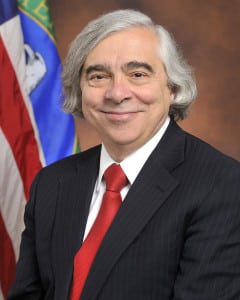
If it wasn’t already clear where the battle lines in the fight over the Department of Energy’s proposed fiscal 2017 budget would be drawn, three consecutive days of hearings this week left little doubt. For the most part, the response to the requested budget was exactly what was expected: The left side of the aisle praised the budget for increases in research and development for renewables, and the right criticized the decrease in funding for fossil energy R&D.
FER&D funding is set at $600 million, 5.1 percent less than current funding, in the request. Total requested funds would account for only $360 million of the full funding amount for the program, with the remaining $240 million coming from prior-year funding for carbon capture projects that have not yet reached financial close.
Under the request, carbon capture research and development would be funded at $170.4 million, up $39.4 million above the current budget. Carbon storage research funding does not fare as well in the DOE budget plan: The department has requested $91 million, a decrease of $15.1 million from fiscal 2016. The rest of the funding will be used for crosscutting programs, advanced energy systems, cross‐cutting, fuel supply impact mitigation, and unconventional fossil energy technologies, among other things.
As many Republicans on the three separate panels Secretary of Energy Ernest Moniz sat before this week mentioned, $600 million is a great deal less than the $2.8 billion requested for the DOE’s Office of Energy Efficiency and Renewable Energy. “Today you present us with an energy budget that slashes funding for coal research in favor of renewable energy. Congress has repeatedly restored funding for coal research and development, and in doing so has sent a very clear message about our priorities for our national energy policy,” House Appropriations Committee Chairman Hal Rogers (R-Ky.) said Tuesday during a hearing of the Energy and Water Development, and Related Agencies Subcommittee.
Rogers went on to charge that while the administration likes to state that it supports an all-of-the-above energy policy, if that were true they would increase funding for clean coal programs.
Moniz fielded similar claims in all three of this week’s hearing, answering lawmakers by explaining that the FER&D program is not the only source of government support for clean coal tech. “There are many aspects of support for coal going forward that are not simply in the fossil energy budget. In particular, I do want to emphasize the probably $5 billion in both production tax credits and investment tax credits proposed for carbon capture and sequestration,” Moniz said, referencing a request in the Treasury Department fiscal 2017 budget proposal, Thursday at a hearing of the Senate Energy and Natural Resources Committee
In a somewhat unexpected comment during a Wednesday hearing of the House Energy and Commerce Subcommittee on Energy and Power, Rep. David McKinley (R-W.Va.) accused DOE of chasing “the wrong rabbit” when it comes to carbon capture and storage.
“I think that the focus has been trying to force the existing coal-fired power plants to add carbon capture and storage as an aftermarket retrofit, even though virtually every nation on the globe has turned their backs on CCS,” he said, suggesting the department should instead focus on increasing the efficiency of new plants. “I don’t understand why DOE continues to chase this rabbit — I think the wrong rabbit — of pushing CCS on our utilities when they should be encouraging high-efficiency facilities.”
Moniz, perhaps pulling from a comment made by House Appropriations Committee Ranking Member Nita Lowey (D-N.Y.) at the prior day’s hearing, explained that it is DOE’s mission to develop long-term technology solutions. “Investing in clean energy saves money down the line by mitigating the impact climate change will have on our nation and the world. That is why the Department of Energy focus on clean energy, including carbon capture technology, is so important,” Lowey said.
Moniz faced West Virginia Sens. Joe Manchin (D) and Shelley Moore Capito (R) Thursday in the Energy and Natural Resources Committee, where they criticized the administration for turning its back on coal, a vital economic driver in the state.
“Between July 2014 and July 2015, in my state of West Virginia we lost 19,000 jobs,“ Manchin noted, though he did not specify if all of those jobs were coal job. He added that, “We’re not arguing against technology, renewables, we’re for all of that, but if you’re going to be needing a baseload of power that you’ve counted on for a long time, and will count on for a longer period of time, then there has to be some support.”
The senator further accused the administration of being insincere. “I know the administration has the appearance of wanting to do clean coal technology, but nothing is happening,” he said.
In response, Moniz noted several administration resources available to transitioning communities.